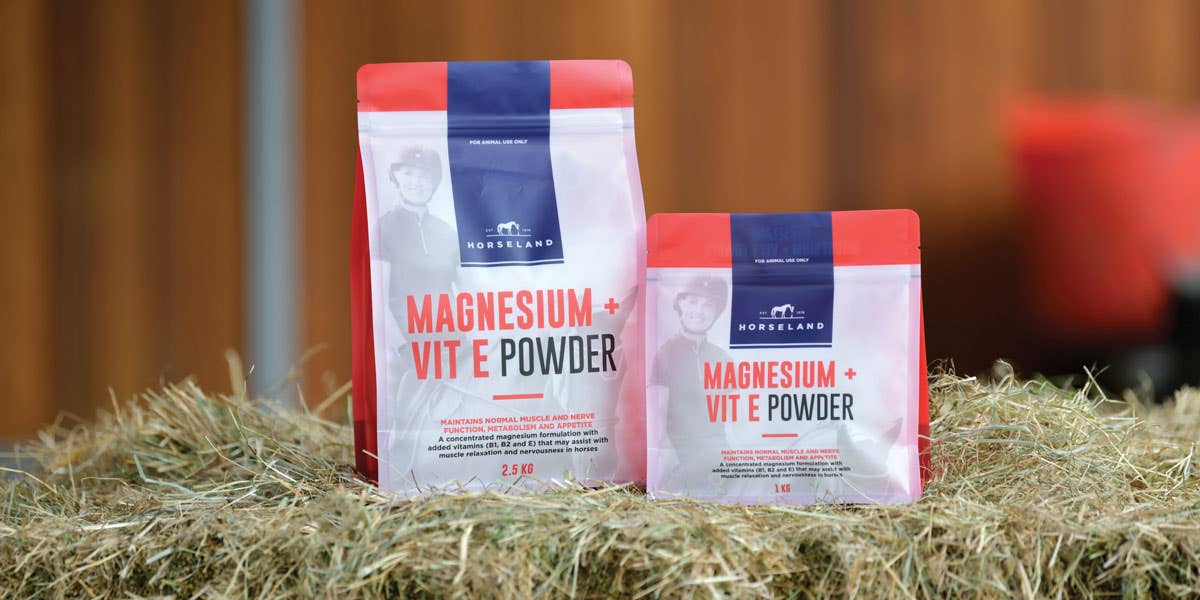5 min read


You may have heard, but we recently launched a brand-new horse health range at Horseland which is full of amazing supplements to ensure your horse is looking and feeling their best. This incredibly affordable new range has a fantastic Magnesium + Vitamin E Powder which may reduce your horse’s nervousness and improve their overall health.
What does magnesium do?
Magnesium is an essential macromineral consumed in the diet of horses. Over 300 biochemical reactions in the horse’s body rely on magnesium to occur, including any reaction that uses ATP (the principal molecule for storing and transferring energy in cells). Up to 60% of magnesium in the body is stored in the skeleton and approximately 30% can be found in muscle. Magnesium assists in maintaining normal nerve and muscle function, helps adjust blood glucose levels, supports a healthy immune system and is needed to keep bones strong. It’s also important for the nervous system, playing a role in optimal nerve transmission and neuromuscular coordination. Magnesium helps defend neuronal cells from oxidative stress and cell death by protecting them against excessive excitation.
How much magnesium does a horse need?
The National Research Council (NRC) publishes guidelines on the nutritional requirements of horses and according to their guidelines (2007), horses require 15 mg of magnesium per kilogram of bodyweight per day for maintenance. This means a healthy 500 kg horse not in work requires a minimum of 7.5 g of magnesium per day to maintain normal levels. The majority of this can be gained adequately through a normal diet that consists mostly of roughage.
Horses that are growing, in work, lactating or that are stressed, have an increased need for magnesium. A large amount of magnesium can also be lost through sweat, therefore horses that undergo moderate to intense exercise, during transport or hot weather will have an increased requirement for magnesium, generally 1.5 to 2 times maintenance. Horses can also lose magnesium during periods of illness and stress, particularly if they have diarrhoea. Uptake of magnesium during these times may also be limited due to poor absorption or decreased food intake.
Feeds that are rich in potassium and low in sodium may also cause issues with magnesium absorption in horses. It has been suggested that during periods of rapid grass growth such as in spring, pastures can become low in magnesium and horses that are pasture-fed may require increased magnesium from other sources to account for the loss.
How do I know if my horse needs a magnesium supplement?
The clinical signs of magnesium deficiency in horses include nervousness, muscle tremors, incoordination, rapid breathing, possible collapse and (very rarely) death. Inadequate levels of magnesium in the diet, particularly in performance horses, may however lead to reduced tolerance to exercise, muscle cramping, fatigue, lack of focus and the potential for tying up. This may result in horses displaying behavioural issues and decreases in performance as a negative association with work is developed.
Magnesium is a common ingredient in supplements for calming horses. Although research has shown some support that supplementing horses with daily magnesium may have a calming effect, more research is required. Human and rat studies have shown that supplementing magnesium into the diet may help with brain function to reduce stress and anxiety. Whether the same effect is present in horses requires further investigation but there is some evidence that suggests supplementing magnesium in combination with vitamin B1 may help to reduce the stress response.
Regardless of the calming or stress-reducing effects, magnesium is an important mineral for health and performance in horses. It’s beneficial in supporting the normal function of the nervous system and helps maintain optimal muscle function.
Which type of magnesium is the best for horses?
Magnesium can be supplemented in several different forms. Magnesium oxide is commonly used in supplements for horses as it is readily absorbed, much less is required compared with other forms and the body will only absorb it if needed. Although magnesium sulfate (Epsom Salt) is also highly absorbable, three times the amount is needed to get the same magnesium content and it can cause a laxative effect when used daily. Chelated magnesium has been shown to be much better absorbed in humans, but little research has been done in horses on its availability, and it’s generally more expensive than other forms.
Using a supplement such as the Horseland Magnesium + Vit E Powder that contains magnesium oxide combined with vitamins B1, B2 and E may be beneficial to maintain normal muscle and nerve function in horses, especially during periods of stress, training or competition. It may also help reduce behavioural issues in performance horses where levels of magnesium in the diet may be low. Before adding any supplement to your horse’s diet, it’s recommended you seek professional advice from an equine nutritionist or veterinarian to ensure that your horse needs it and that the right amount is being provided.
Make sure your horse is the best version of themselves with our new Horseland Health products! To shop the new range and give your horse the nutrition they deserve head into your local Horseland store or browse online.

